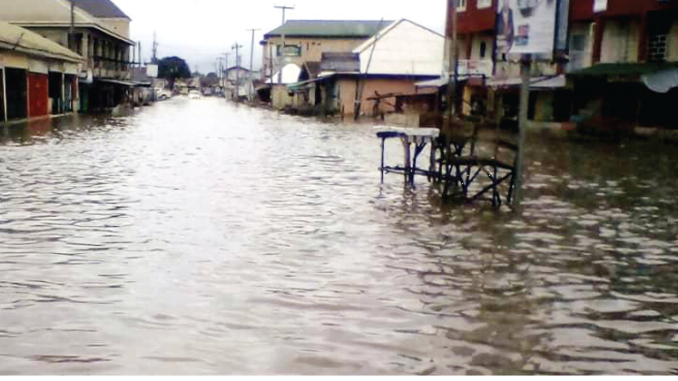
AS the year’s rainy season intensifies, the effects are being felt globally. As seen in China to Germany and parts of the United States, deadly downpours pounded cities everywhere, submerging vehicles, homes and killing hundreds in a manifestation of the palpable warning for urgent action to shield the planet against severe heat dome and atmospheric pressure.
In Lagos, flooding overran the metropolis, occupying homes and vehicles, especially in many parts of the Island. Lagos is among coastal cities predicted by Climate Central, a non-profit, to be completely submerged by 2100. The threats of climate change fuelled by global warming are no longer a hoax, as some pretend. China’s downpours, which subdued roads and subways, were regarded as the heaviest in 1,000 years with devastating effects.
The incident, dubbed in many places as the worst flooding in decades, also gripped Belgium, The Netherlands, Luxembourg, and Switzerland. In 2009, 2011 and 2013, Saudi Arabia was ravaged by flash floods, which left people dead and swept through hitherto fortified dwellings.
Though the recent flood disasters appeared to have caught many of the affected countries unawares, they nonetheless hurriedly moved to action to build effective flood defences and take urgent action in furtherance of their resolve to combat climate change. Germany’s Chancellor, Angela Merkel, called for a resolute battle against climate change. It is certain that the country and its peers will walk the talk. If countries with redoubtable technological innovations, pragmatic policies and focussed leadership could be riddled with intense flooding, Nigeria must strive not to be caught napping as the world moves for a better flood management system to mitigate the effects of floodwaters and curb future occurrence.
The concerned authorities in Nigeria should concentrate their energies on coastal and inland areas in the country, particularly flood-prone areas, by using modern flood control techniques to combat flooding, which may not recede anytime soon. Both past and recent reports on flood disasters in Kano, Taraba and Lagos among some other states left a sour taste in mouth. This is the reason why both the state and federal governments must join forces to see flooding as a national emergency.
The annual approach to tackling flooding during the rainy season without any tangible practical, long-term plans worsens the gravity of the predicament. At a 2020 Flood After Action Review Technical meeting organised for concerned parties in Abuja, the National Emergency Management Agency noted that about 129,000 persons were affected by flooding and 68 persons killed in different parts of the country in 2020. NEMA stated that flooding destroyed property, farmland across 320 local government areas in 35 states, including the Federal Capital Territory. This exposes the dire reality of the situation.
Lagos and other states prone to coastal flooding ought to brace for the challenges ahead by exploring flood risk management strategies to fight future flood threats. The warning by the Nigeria Hydrological Services Agency that Lagos residents should prepare for severe floods in many parts of the state in September is enough to nudge the government into action with collaborative efforts from neighbouring Ogun State. The agency stated that no new holding dam had been constructed across the River Niger in Nigeria and the course of the Ladgo Dam in Cameroon to mitigate the impact of floods arising from the possible opening of the dam. Though the agency noted that a dam was being designed by experts for that purpose ahead of the actual budget preparation for the facility, the two states especially should not forget the effects on Nigeria when water was released from the Ladgo Dam in 2014 and 2016.
Besides, there is a looming impact on the South-West with the awaited opening of the Oyan River Dam in Abeokuta, Ogun State, to release water. There is the need to collaborate with those in charge of dams in and out of Nigeria on water control measures upon releasing waters during intense rainfall.
Lagos State should consider initiating restoration strategies on the environment in its dogged land reclamation drive which hinders normal water flow and obstructs inlets and outlets into wider water bodies. It must responsibly reflect that economy and ecology have differing faces in land fill processes. Vigorous ground re-contouring, subsoil and topsoil replacement, including revegetation and seeding, will generate huge incomes for the state to the detriment of the environment. But ecology, no matter how long it takes, will always demand its due; water always finds its level. Government should read the Riot Act to residents against blocking gutters and drains with solid waste. It must be proactive, responsible and purpose-driven. The state ought to have curbed the revolting act of residents emptying refuse in gutters and drains during heavy rains. A widespread act among ignorant dwellers across states in the country, Lagos cannot hesitate in halting the trend which not only clogs drains and traps rainwater, but also worsens flooding in the state.
The state government should strengthen efforts in de-silting blocked drains and go hard on recalcitrant citizens with a penchant for activities capable of hurting the environment. There should be long-term solutions by the governments to include reinforcement of the town planning laws and implementation of the modern waste disposal system. With a central waste collection system absent in many communities, people patronise cart pushers to dispose of their refuse. Governments at the local, state, and federal levels must not allow houses and shanties on water drains if the country genuinely wants to mitigate impact of floods notably in coastal belt regions and along River Niger and River Benue courses.
END

Be the first to comment